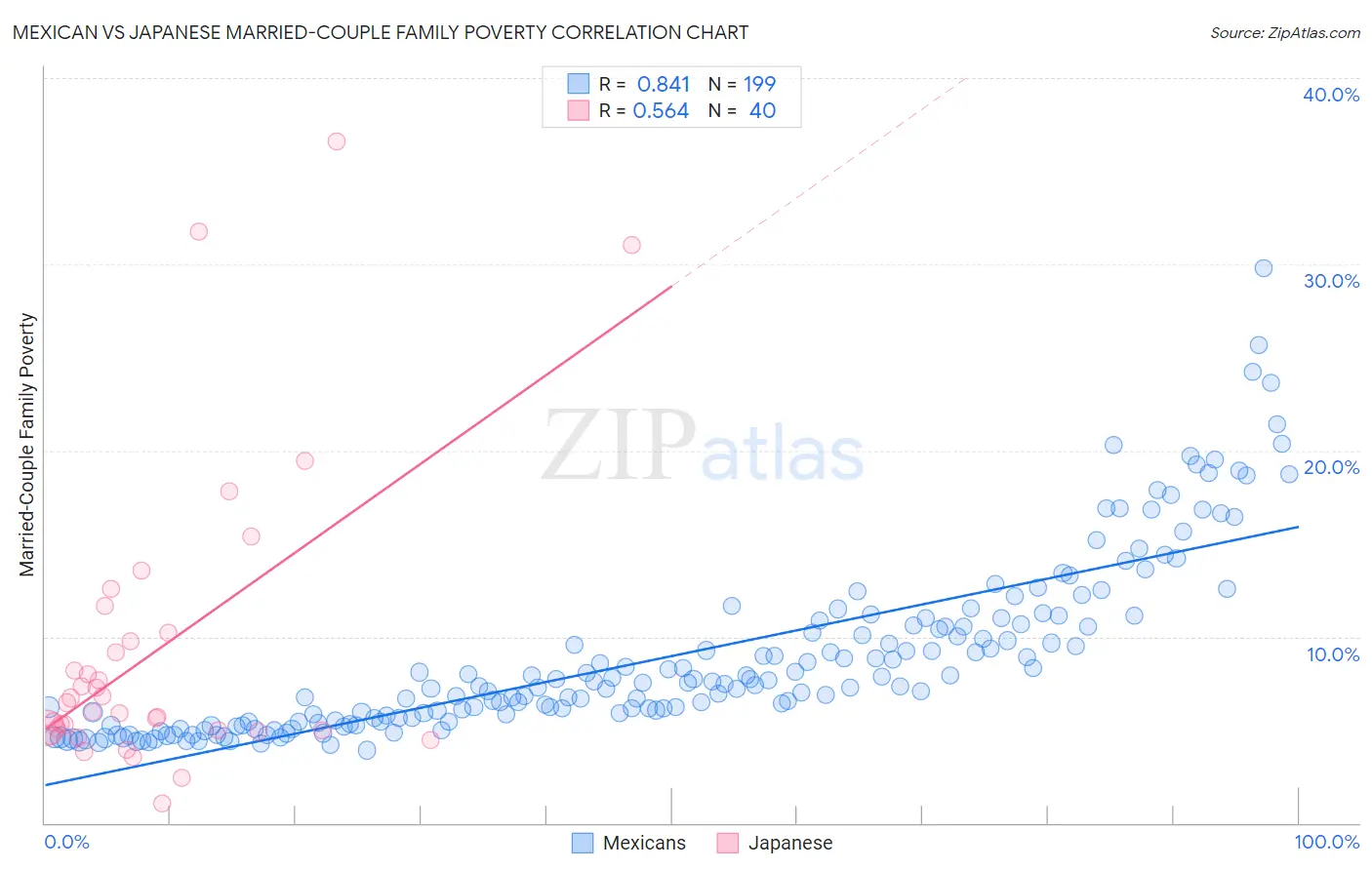Mexican vs Japanese Married-Couple Family Poverty
COMPARE
Mexican
Japanese
Married-Couple Family Poverty
Married-Couple Family Poverty Comparison
Mexicans
Japanese
7.2%
MARRIED-COUPLE FAMILY POVERTY
0.0/ 100
METRIC RATING
317th/ 347
METRIC RANK
5.6%
MARRIED-COUPLE FAMILY POVERTY
9.8/ 100
METRIC RATING
219th/ 347
METRIC RANK
Mexican vs Japanese Married-Couple Family Poverty Correlation Chart
The statistical analysis conducted on geographies consisting of 552,712,158 people shows a very strong positive correlation between the proportion of Mexicans and poverty level among married-couple families in the United States with a correlation coefficient (R) of 0.841 and weighted average of 7.2%. Similarly, the statistical analysis conducted on geographies consisting of 247,969,020 people shows a substantial positive correlation between the proportion of Japanese and poverty level among married-couple families in the United States with a correlation coefficient (R) of 0.564 and weighted average of 5.6%, a difference of 29.2%.

Married-Couple Family Poverty Correlation Summary
| Measurement | Mexican | Japanese |
| Minimum | 3.9% | 1.1% |
| Maximum | 29.8% | 36.6% |
| Range | 25.9% | 35.5% |
| Mean | 8.9% | 9.3% |
| Median | 7.4% | 6.2% |
| Interquartile 25% (IQ1) | 5.5% | 5.0% |
| Interquartile 75% (IQ3) | 10.6% | 10.0% |
| Interquartile Range (IQR) | 5.1% | 5.0% |
| Standard Deviation (Sample) | 4.7% | 8.0% |
| Standard Deviation (Population) | 4.7% | 7.9% |
Similar Demographics by Married-Couple Family Poverty
Demographics Similar to Mexicans by Married-Couple Family Poverty
In terms of married-couple family poverty, the demographic groups most similar to Mexicans are Immigrants from Guatemala (7.2%, a difference of 0.17%), Honduran (7.2%, a difference of 0.31%), Immigrants from Latin America (7.2%, a difference of 0.34%), Inupiat (7.1%, a difference of 0.47%), and British West Indian (7.1%, a difference of 0.70%).
| Demographics | Rating | Rank | Married-Couple Family Poverty |
| Immigrants | Nicaragua | 0.0 /100 | #310 | Tragic 7.1% |
| Immigrants | Dominica | 0.0 /100 | #311 | Tragic 7.1% |
| Immigrants | Armenia | 0.0 /100 | #312 | Tragic 7.1% |
| Immigrants | St. Vincent and the Grenadines | 0.0 /100 | #313 | Tragic 7.1% |
| British West Indians | 0.0 /100 | #314 | Tragic 7.1% |
| Inupiat | 0.0 /100 | #315 | Tragic 7.1% |
| Hondurans | 0.0 /100 | #316 | Tragic 7.2% |
| Mexicans | 0.0 /100 | #317 | Tragic 7.2% |
| Immigrants | Guatemala | 0.0 /100 | #318 | Tragic 7.2% |
| Immigrants | Latin America | 0.0 /100 | #319 | Tragic 7.2% |
| Immigrants | Grenada | 0.0 /100 | #320 | Tragic 7.3% |
| Immigrants | Caribbean | 0.0 /100 | #321 | Tragic 7.3% |
| Immigrants | Honduras | 0.0 /100 | #322 | Tragic 7.3% |
| Vietnamese | 0.0 /100 | #323 | Tragic 7.4% |
| Immigrants | Central America | 0.0 /100 | #324 | Tragic 7.4% |
Demographics Similar to Japanese by Married-Couple Family Poverty
In terms of married-couple family poverty, the demographic groups most similar to Japanese are Colombian (5.6%, a difference of 0.19%), Panamanian (5.6%, a difference of 0.21%), Afghan (5.5%, a difference of 0.40%), Immigrants from Nigeria (5.5%, a difference of 0.42%), and Potawatomi (5.5%, a difference of 0.71%).
| Demographics | Rating | Rank | Married-Couple Family Poverty |
| Immigrants | Thailand | 14.0 /100 | #212 | Poor 5.5% |
| Immigrants | Liberia | 13.3 /100 | #213 | Poor 5.5% |
| Iroquois | 13.1 /100 | #214 | Poor 5.5% |
| Armenians | 12.8 /100 | #215 | Poor 5.5% |
| Potawatomi | 12.4 /100 | #216 | Poor 5.5% |
| Immigrants | Nigeria | 11.3 /100 | #217 | Poor 5.5% |
| Afghans | 11.2 /100 | #218 | Poor 5.5% |
| Japanese | 9.8 /100 | #219 | Tragic 5.6% |
| Colombians | 9.2 /100 | #220 | Tragic 5.6% |
| Panamanians | 9.2 /100 | #221 | Tragic 5.6% |
| Cajuns | 6.9 /100 | #222 | Tragic 5.6% |
| Immigrants | Fiji | 6.7 /100 | #223 | Tragic 5.6% |
| Sudanese | 6.4 /100 | #224 | Tragic 5.6% |
| Immigrants | Cambodia | 6.1 /100 | #225 | Tragic 5.6% |
| South Americans | 5.7 /100 | #226 | Tragic 5.6% |